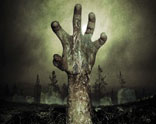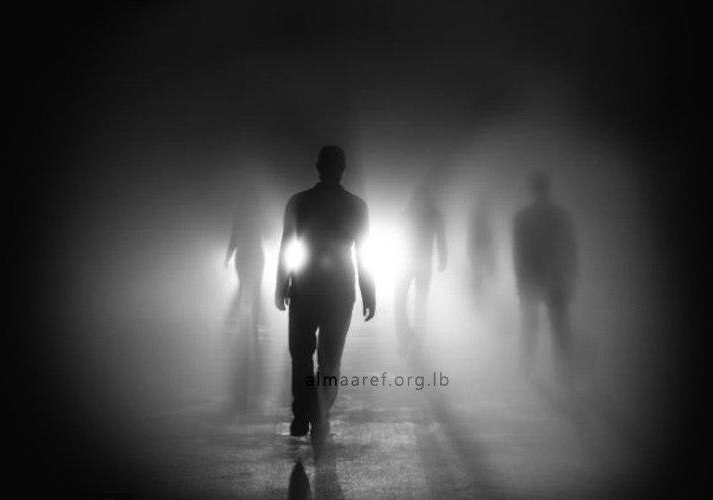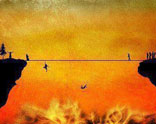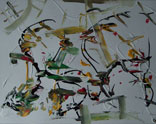Sins which Make a Man Die Faithless
Knowledge of the hereafter
All the verses and hadiths which were mentioned so far, about going of deeds in vain were regarding kufr (atheism) and shirk (polytheism). But what about other sins or offenses? Do they also make good deeds go in vain?
Yes! Some of the sins are such according to some specific narrations. For example, regarding disobedience to parents, it is mentioned by the impeccable: A voice will be heard: Yaa Aaq! I'mal Maa Shi'Ta Meaning: O disobedient to parents! Do whatever you wish, none of your good deeds will ever be accepted).
If someone has made his or her mother unhappy, her complaint will burn down into ashes good deeds even if they are of Himalian size. Some other sins like making false allegations against others also make one faithless. Likewise it is also mentioned that if one is very jealous and openly causing pain to others then, according to a narration: Ya Kulul Eeman Ka Maa Ta'Kulun Naar Al Hatab, are also of this kind as we have said earlier.
Faith (Imaan) Is The Expiation Of Kufr (Denial) And Taubah (Repentance) Is The Atonement Of Gunah (Sins)
The mawaddah (root) of 'Takfeer' is 'Kufr'. Wa Yukafi Anhum Saiyiaatihim (Surah Fath 48:5). It means covering (hiding) and to remove the effect of sins. There is no doubt that becoming mo’min (believing) removes the effects of earlier kufr (disbelief). So if one was faithless from the beginning of his life but he believed (became Muslim) at the end and dies, he will certainly get salvation.
But the thing which can remove the effects of sins committed by a faithful person is true repentance. The Holy Quran says: Fa Oo Laa Ika…Hasanaat. (Surah Furqaan 25:7). It means that the kind and Merciful Allah changes their sins and offenses into good deeds and virtues.
Good Deeds Which Remove Evils
Do any other good deeds except true Tawbah also remove sins? The answer is: Innal Hasanaat Yuzhibnas Saiyiaat (Surah Hud 11:114). This apparently shows that doing good deeds removes the effects of bad or evils. But it could not be made specific as to which good deeds are so effective. Of course there are many narrations that speak about such good deeds. For instance, it is mentioned in Behaar-ul-Anwaar, vol.15 that a man came to the Holy Prophet (peace be upon him and his household) and submitted: O messenger of God! I have committed a very big sin (he had, when he was a Kafir, buried his daughter alive). So please show me a good deed that may result in my forgiveness by Allah. Hazrat replied: Is your mother alive? He replied in the negative. (This indicates that behaving nicely with mother is the best remedy for the removal of great consequences of great sins). The Holy Prophet asked: Is your aunt alive? He said: Yes. The Hazrat said: Go and behave nicely with your aunt (it will turn into a good behavior with your mother due to her close relation with your late mother). Then the Holy Prophet added: Lav Kaa Na Ummahu Meaning: It would have been better had his mother been alive, because good behavior with mother is very effective in removing consequences of such sins.
Questions On The Day Of Resurrection
It is mentioned at many places in the Holy Quran that the Messengers and the communities will be asked: Fa La Nas… (Surah A’raf: 6) meaning: Then We surely will ask those communities to whom messengers were sent about everything and also ask the Prophets.
The messengers and Prophets will be asked: We had sent you to invite people towards Us. Did you convey the message to them? They will submit: Our Lord! You are witness that we left no stone unturned in this matter. A voice will be heard 'Who is your witness?' All will reply: O Our Lord! Our witness is the last prophet Muhammad (peace be upon him and his household).
Wa Ka…Shaheda. (Surah Baqarah 2:143) meaning: Similarly, We made you a just community so that you may stand as witness before other communities and Muhammad may be your witness.
Similarly, Prophet Isa (Maseeh) will be asked: Did you tell people to worship you and your mother? Hazrat Isa (A.S.) will tremble and say: My Lord! Had I said so, You must have known it at once. What I said was only that I am a servant of God. So worship only my Lord and your Lord.
Wa Iz… (Surah Maidah: 116)
Translation: And when (on the Day of Qiyamah) God will ask Isa: O son of Maryam! Did you tell the people: Leave aside God and make me and my mother your God…?
Communities will also be questioned: Did your messenger not inform you about the events of today? All will reply: Balaa, Ya Rabbe. (Yes, O Lord, they did)!
There Will Be Questioning About Bounties Tomorrow On The Day Of Judgement
On the Day of the Grand Gathering (Mahshar) one of the questions will also be about bounties granted to us by the Lord of the Universe as to what was our attitude regarding the same.
Summa…Naeem. (Surah Takasur 102:8). Meaning: Then you will certainly be questioned about the bounties. Did you thank God for the bounties or you lived and behaved ungratefully?
There are different narrations regarding unthankfulness. The combined summary is that there are several standards of bounties, the most important and the highest rank is that of the bounty of wilayat of Aale Muhammad, rather it is the only absolute bounty.
Imam (A.S.) said to Qatadah: What do you Sunnis say about the Holy verse: Summa Latus Alunna…? He replied: There will be questions about these food articles like bread and water etc. The Imam (A.S.) said: God is far higher than the questioner of such queries. Will you ever invite a guest and, after serving him good food, ask him about what he ate? Qatadah asked: Then what is meant by Naeem? The Hazrat replied: It is the bounty in the form of we, the Aale Muhammad (A.S.)'s love.
How Was Your Behavior With The Bounty Of Wilayat?
It will be asked on the Day: How did you deal with Aale Muhammad? To what extent did you love them? How much did you obey them? Enemies of Ahle Bayt will be asked: Why did you have enmity towards this great bounty? Nothing will be asked about food and water, except extravagance made in it or about gaining it from prohibited sources and about spending it in Haraam ways. Likewise it will be asked: Why did you commit such and such prohibited deeds?
Everyone Will Be Questioned About Four Things
Specific questions will be asked regarding some bounties. One of them is man's lifespan. It is mentioned in narrations that angels will not allow people to go further in the field of Mahshar until they reply for queries:
1- How did he spend life and in which deeds was he engaged during his youth.
2- Where from and how he or she earned money and where and how spent it?
3- There will be questioning about the Wilayat of Aale Muhammad (A.S.) and the Divine Law will be enforced very strictly in this matter.
4- Where does one spend wealth? If it was given to the poor for making a show of generosity, it would draw punishment.
There Will Be Questioning About Worships
Waquiffohum…Mas Ooloon (Surah Saaffaat: 24) Meaning: Just stop them. They have to be questioned.
The first question in Mahshar will be about Namaz prayer. Awwalu…Sivaahaa. (Bihar-ul-Anwar vol.3)
Were the compulsory (obligatory) prayers offered in their fixed times or not? Since this Namaz (Salaat) is the biggest pillar of religion and the greatest trust of God, was it offered properly? Then there will be questions about all other worships and prayers.
Sins (Offences) Are Of Three Kinds
Amirul Momineen Ali (A.S.) says in Nahaj-ul-Balagha: Zunbun…Maghfoor meaning: Sins are of three kinds: The one which will be forgiven, two; the committee of which can hope for pardon and three; the sin which will never be forgiven.
The forgivable sin will be that which might have been paid for in the world. For example, the offender might have been punished according to Sharia Law because God is far higher than the one who may punish anybody twice for one and the same offense. Another kind of sin which can be hoped to be pardoned is the sin the compensation for which might not have been made in the worldly life but the offender had made a true Tawbah (repentance).
Mirsad Or The Valley Of People’s Rights
The Third sin which is not at all forgivable is the taking away of someone's right or oppressing somebody. These are the rights of people. God will never overlook them. If one has taken unfairly or oppressively even a little trifling thing of somebody unjustly, Almighty Allah will make the oppressor repay it to the oppressed. That is why the meaning of the words Mirsaad in the verse 'Inna Rabbaka Labil Mirsad' (Surah Fajr 89:14) is mentioned as the 'Valley of people's rights', that is to say; your Lord is there to make everyone's right repaid to him.
Suspension For One Year Because Of A Straw
Muhaddis Qumi has, in Manazil-al-Akhira, recorded the story of a famous pious man Sulaiman Daaraai, the well-known worshiper. He writes that after he died, some people saw him in their dreams and asked about his condition. He said: I have remained suspended for one year in a valley. The reason is that, one-day, some people were carrying bundles of grass to the city. I just took one straw from a bundle and used it as a toothpick. After my death, I am in this chastisement for the last one year for the sin of not obtaining the consent of the owner of the grass before taking up the straw from his bundle. They (the angels) ask me: Did you know that the owner was agreeable?
A Thousand Years In The Valley Of Oppressions
Do not ask: Is a straw too of any worth? It is true that its value is insignificant. Yet, it is a property anyway, of someone. Some people take up some things from the property of the owner before the latter's eyes (the owner keeps mum because of a regard or respect). Such taking away of other's property is called 'Akhz-be-Hayaa' about which it is mentioned in narrations that it is just like usurpation and hence prohibited or Haraam.
Do such deeds that, while leaving this world, there may not be even the slightest burden on your shoulders. If you were careless about it till now, still try to obtain the agreement of the owners of the usurped things. This valley of rights too has stages depending on the people. It is written that for some, such suspension will be for a thousand years.
Encroachment Of Others Rights
God Almighty will deal with people in two ways. One dealing will be based on Adl (Justice of God) and another based on Grace (Fazl and Karam). Everyone who has to pay someone's rights will be compensated by snatching away some good deeds of the oppressor and giving them to the oppressed one. This dealing will be based on Adl (justice). For instance, somebody had put a false allegation on someone or had backbitten him or her. Now only God knows how many of the good deeds of the backbiter should be taken from him and given to the oppressed one. Now, in case, the oppressor has nothing like a good deed in his account, the demand of the Divine Justice will be that a proportionate sin of the oppressed may be added to the account of the oppressor or backbiter.
* The Hereafter - Ma'ad. Chapter 3. By Ayatullah Dastghaib Shiraazi (q.s.).




















